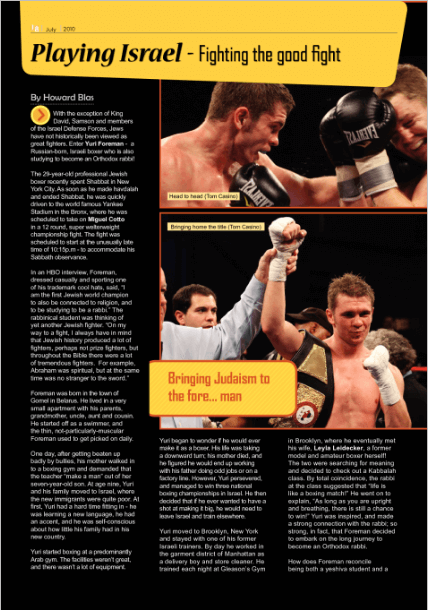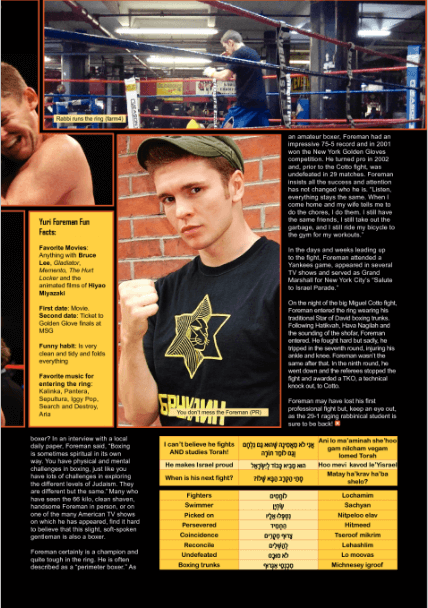Original Article Published on The Jerusalem Post
With the exception of King David, Samson and members of the Israel Defense Forces, Jews have not historically been viewed as great fighters. Enter Yuri Foreman – a Russian-born, Israeli boxer who is also studying to become an Orthodox rabbi!
The 29-year-old professional Jewish boxer recently spent Shabbat in New York City. As soon as he made havdalah and ended Shabbat, he was quickly driven to the world famous Yankee Stadium in the Bronx, where he was scheduled to take on Miguel Cotto in a 12 round, super welterweight championship fight. The fight was scheduled to start at the unusually late time of 10:15p.m – to accommodate his Sabbath observance.
In an HBO interview, Foreman, dressed casually and sporting one of his trademark cool hats, said, I am the first Jewish world champion to also be connected to religion, and to be studying to be a rabbi. The rabbinical student was thinking of yet another Jewish fighter. On my way to a fight, I always have in mind that Jewish history produced a lot of fighters, perhaps not prize fighters, but throughout the Bible there were a lot of tremendous fighters. For example, Abraham was spiritual, but at the same time was no stranger to the sword.
Foreman was born in the town of Gomel in Belarus. He lived in a very small apartment with his parents, grandmother, uncle, aunt and cousin. He started off as a swimmer, and the thin, not-particularly-muscular Foreman used to get picked on daily.
One day, after getting beaten up badly by bullies, his mother walked in to a boxing gym and demanded that the teacher make a man out of her seven-year-old son. At age nine, Yuri and his family moved to Israel, where the new immigrants were quite poor. At first, Yuri had a hard time fitting in – he was learning a new language, he had an accent, and he was self-conscious about how little his family had in his new country.
Yuri started boxing at a predominantly Arab gym. The facilities weren’t great, and there wasn’t a lot of equipment.
Yuri began to wonder if he would ever make it as a boxer. His life was taking a downward turn; his mother died, and he figured he would end up working with his father doing odd jobs or on a factory line. However, Yuri persevered, and managed to win three national boxing championships in Israel. He then decided that if he ever wanted to have a shot at making it big, he would need to leave Israel and train elsewhere.
Yuri moved to Brooklyn, New York and stayed with one of his former Israeli trainers. By day he worked in the garment district of Manhattan as a delivery boy and store cleaner. He trained each night at Gleason’s Gym in Brooklyn, where he eventually met his wife, Leyla Leidecker, a former model and amateur boxer herself! The two were searching for meaning and decided to check out a Kabbalah class. By total coincidence, the rabbi at the class suggested that life is like a boxing match! He went on to explain, As long as you are upright and breathing, there is still a chance to win! Yuri was inspired, and made a strong connection with the rabbi; so strong, in fact, that Foreman decided to embark on the long journey to become an Orthodox rabbi.
How does Foreman reconcile being both a yeshiva student and a boxer? In an interview with a local daily paper, Foreman said, Boxing is sometimes spiritual in its own way. You have physical and mental challenges in boxing, just like you have lots of challenges in exploring the different levels of Judaism. They are different but the same. Many who have seen the 66 kilo, clean shaven, handsome Foreman in person, or on one of the many American TV shows on which he has appeared, find it hard to believe that this slight, soft-spoken gentleman is also a boxer.
Foreman certainly is a champion and quite tough in the ring. He is often described as a perimeter boxer. As an amateur boxer, Foreman had an impressive 75-5 record and in 2001 won the New York Golden Gloves competition. He turned pro in 2002 and, prior to the Cotto fight, was undefeated in 29 matches. Foreman insists all the success and attention has not changed who he is. Listen, everything stays the same. When I come home and my wife tells me to do the chores, I do them. I still have the same friends, I still take out the garbage, and I still ride my bicycle to the gym for my workouts.
In the days and weeks leading up to the fight, Foreman attended a Yankees game, appeared in several TV shows and served as Grand Marshall for New York City’s Salute to Israel Parade.
On the night of the big Miguel Cotto fight, Foreman entered the ring wearing his traditional Star of David boxing trunks. Following Hatikvah, Hava Nagilah and the sounding of the shofar, Foreman entered. He fought hard but sadly, he tripped in the seventh round, injuring his ankle and knee. Foreman wasn’t the same after that. In the ninth round, he went down and the referees stopped the fight and awarded a TKO, a technical knock out, to Cotto.
Foreman may have lost his first professional fight but, keep an eye out, as the 29-1 raging rabbinical student is sure to be back!





